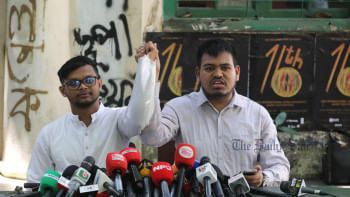Ensure one-third seats for women in JS

Increasing parliamentary seats in line with the country's population and guaranteeing at least one-third women's participation through direct elections are crucial for effective representation, said speakers at an event yesterday.
To safeguard existing constituencies, they recommended forming each reserved women's seat by combining two general seats without disrupting the electoral bases already established by political parties.
Although each reserved constituency would be larger, the system is proposed to remain in force for only two to three terms, giving women candidates the opportunity to build their own constituencies and play a stronger role in law-making and political decision-making, they added.
The observations came at a roundtable titled "Effective and Meaningful Representation of Women in Parliament: Direct Elections to Reserved Women's Seats", organised by the Members of the Social Resistance Committee -- a platform of 71 women, human rights and development organisations -- at the CIRDAP auditorium in the capital.
The discussion was organised on the occasion of CEDAW Day (September 3), the Convention on the Elimination of All Forms of Discrimination Against Women, an international treaty aimed at ensuring women's rights and eliminating gender-based discrimination.
Nijera Kori coordinator Khushi Kabir delivered the keynote, urging that both men and women be allowed to contest general seats while reserved seats for women continue.
She proposed increasing the total number of parliamentary seats to 450, comprising 300 general seats and 150 reserved seats, each formed by combining two constituencies, with nominations replaced by direct elections.
She recommended this arrangement remain in effect for a maximum of two to three terms.
Dr Nilofar Chowdhury Moni, former BNP MP, criticised the continued uncertainty over nominations for women, noting that political parties have wasted time instead of implementing the 33 percent representation mandated by the RPO. She emphasised that women can participate equally if patriarchal attitudes in politics are challenged.
Advocate SMA Sabur, acting president of Oikya NAP, demanded political parties take effective steps to increase women's representation.
Barrister Shamim Haider Patwary, secretary general of the Jatiya Party, noted that constitutional guarantees of gender equality remain largely unimplemented.
Ruhin Hossain Prince, general secretary of the Communist Party of Bangladesh, highlighted the importance of raising awareness among women voters.
Maleka Banu, general secretary of Mahila Parishad, said women's participation in politics, economics, and society remains marginal, and urged that women contest both general and reserved seats while building their own constituencies.
Moderator Dr Fauzia Moslem, president of Mahila Parishad, stressed that according to Article 7 of CEDAW, implementation of women's political participation is the government's responsibility.
Saiful Haque, general secretary of the Revolutionary Workers Party, and Bazlur Rashid, general secretary of BASAD, also spoke.

 For all latest news, follow The Daily Star's Google News channel.
For all latest news, follow The Daily Star's Google News channel. 



Comments